小升初英语_一般现在时
小升初英语现在进行时与一般现在时、一般将来时混合单选题50题(含答案)

小升初英语现在进行时与一般现在时、一般将来时混合单选题50题(含答案)1.Look! The students ______ in the classroom.A.readB.is readingC.are readingD.reads答案:C。
现在进行时的结构是be+动词的现在分词形式,主语是students,所以be 动词用are,read 的现在分词是reading。
而选项 A 是一般现在时,选项B 中be 动词用错,选项D 也是一般现在时。
2.We ______ English class every day.A.haveB.is havingC.are havingD.has答案:A。
every day 表示一般现在时,主语是we,所以动词用原形have。
选项 B 和 C 是现在进行时,选项 D 用于第三人称单数。
3.The teacher ______ at the blackboard now.A.lookB.is lookingC.looksD.looked答案:B。
now 表示现在进行时,结构是be+动词的现在分词形式,look 的现在分词是looking,主语是teacher,所以be 动词用is。
选项 A 缺少be 动词,选项C 是一般现在时,选项D 是一般过去时。
4.They usually ______ football after school.A.playB.is playingC.are playingD.plays答案:A。
usually 表示一般现在时,主语是they,所以动词用原形play。
选项B 和C 是现在进行时,选项D 用于第三人称单数。
5.Listen! The girl ______ a song.A.singB.is singingC.singsD.sang答案:B。
Listen!表示现在进行时,结构是be+动词的现在分词形式,sing 的现在分词是singing,主语是girl,所以be 动词用is。
小升初英语一般现在时与现在进行时混合单选题50题答案解析版
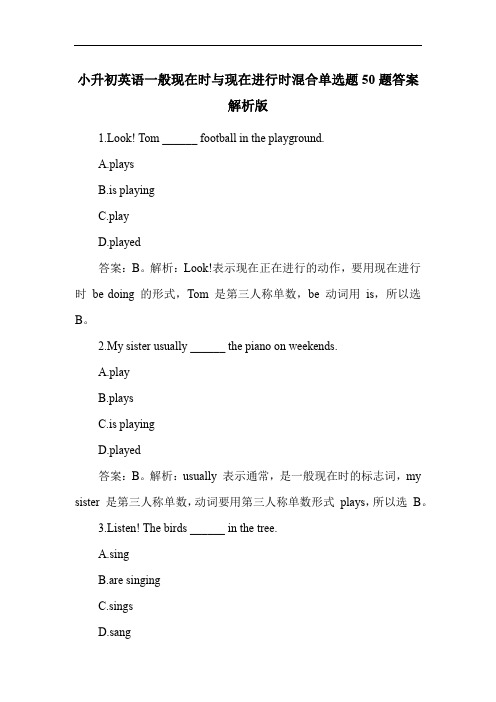
小升初英语一般现在时与现在进行时混合单选题50题答案解析版1.Look! Tom ______ football in the playground.A.playsB.is playingC.playD.played答案:B。
解析:Look!表示现在正在进行的动作,要用现在进行时be doing 的形式,Tom 是第三人称单数,be 动词用is,所以选B。
2.My sister usually ______ the piano on weekends.A.playB.playsC.is playingD.played答案:B。
解析:usually 表示通常,是一般现在时的标志词,my sister 是第三人称单数,动词要用第三人称单数形式plays,所以选B。
3.Listen! The birds ______ in the tree.A.singB.are singingC.singsD.sang答案:B。
解析:Listen!表示现在正在进行的动作,要用现在进行时be doing 的形式,birds 是复数,be 动词用are,所以选B。
4.My father ______ newspapers every morning.A.readB.readsC.is readingD.reading答案:B。
解析:every morning 表示每天早上,是一般现在时的标志词,my father 是第三人称单数,动词要用第三人称单数形式reads,所以选B。
5.The boys ______ games in the park now.A.playB.are playingC.playsD.played答案:B。
解析:now 表示现在,是现在进行时的标志词,boys 是复数,be 动词用are,所以选B。
6.My mother often ______ shopping on Sundays.A.goB.goesC.is goingD.went答案:B。
小升初英语语法:一般现在时

16. She _g_o_e_s__ (go) to school from Monday to Friday.
“辅音字母+y”结尾 变y为i, 再加-es,
fly—flies
特殊情况
have→has do→does go→goes
4、实义动词的一般现在时的基本句型
1) 肯定句:
☺主语(I/We/You/They)+实义动词原形+其他 如:I stay at home on Saturdays. They have sports every day.
回顾一
一般现在时的含义
一般现在时表示经常性或习惯性的动作或存在 的状态等。它通常和表示时间状语连用。
例如: Tom goes to school at 7:30 in the morning.
基本用法
1. 表示现在的情况或状态,或者经常性、习 惯性的动作或状态
I wash the dishes every day. You sometimes take a bus home. They usually have lunch at 11:30. He always gets up early. She is often late for school.
I will visit him when I am free. 我有空就去拜访他。 We will have picnic if it doesn't rain tomorrow. 如果明天不下雨,我们就去野餐。 b.表示按规定,计划,时间要发生的动作。 The plane takes off at 11:00. 飞机11点起飞。 c.表示客观性很强的将来。 Today is Wednesday,so tomorrow is Thursday. 今天是星期三,所以明天是星期四。
小升初英语一般现在时与现在进行时混合单选题50题
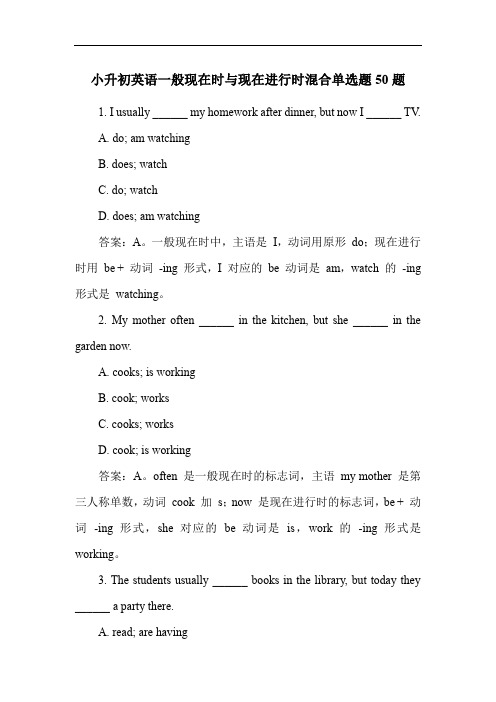
小升初英语一般现在时与现在进行时混合单选题50题1. I usually ______ my homework after dinner, but now I ______ TV.A. do; am watchingB. does; watchC. do; watchD. does; am watching答案:A。
一般现在时中,主语是I,动词用原形do;现在进行时用be + 动词-ing 形式,I 对应的be 动词是am,watch 的-ing 形式是watching。
2. My mother often ______ in the kitchen, but she ______ in the garden now.A. cooks; is workingB. cook; worksC. cooks; worksD. cook; is working答案:A。
often 是一般现在时的标志词,主语my mother 是第三人称单数,动词cook 加s;now 是现在进行时的标志词,be + 动词-ing 形式,she 对应的be 动词是is,work 的-ing 形式是working。
3. The students usually ______ books in the library, but today they ______ a party there.A. read; are havingB. reads; haveC. read; haveD. reads; are having答案:A。
usually 表明一般现在时,主语the students 是复数,动词用原形read;today 表明现在进行时,they 对应的be 动词是are,have 的-ing 形式是having。
4. My father ______ newspapers every morning, but he ______ a football game at the moment.A. reads; is watchingB. read; watchesC. reads; watchesD. read; is watching答案:A。
小升初英语一般现在时疑问句单选题50题

小升初英语一般现在时疑问句单选题50题1. Does Tom play football every day?A. Yes, he does.B. No, he doesn't.C. Yes, he is.D. No, he isn't.答案:A。
本题考查一般现在时的疑问句及回答。
一般现在时中,行为动词作谓语,主语是第三人称单数时,疑问句用助动词does 开头,回答也用does 或doesn't。
Tom 是第三人称单数,问句用Does 开头,肯定回答是Yes, he does. ,否定回答是No, he doesn't. 。
选项C 和D 中的is 用于be 动词作谓语的句子,不符合本题。
2. Do they often go swimming in summer?A. Yes, they do.B. No, they don't.C. Yes, they are.D. No, they aren't.答案:A。
这道题同样考查一般现在时的疑问句及回答。
主语they 是复数,疑问句用助动词do 开头,肯定回答为Yes, they do. ,否定回答为No, they don't. 。
选项C 和D 中的are 用于be 动词作谓语的句子,这里是行为动词go,所以不正确。
3. Does your sister like music?A. Yes, she does.B. No, she doesn't.C. Yes, she is.D. No, she isn't.答案:A。
一般现在时中,主语your sister 是第三人称单数,用助动词does 构成疑问句,肯定回答是Yes, she does. ,否定回答是No, she doesn't. 。
C 和D 中的is 用于be 动词的句子,不符合此处语法。
4. Do you have breakfast at seven?A. Yes, I do.B. No, I don't.C. Yes, I am.D. No, I'm not.答案:A。
小升初英语专题: 时态

一、一般现在时表示经常性或习惯性的动作。
通常会与Usually, often , every, sometime,always搭配。
1、一般现在时的构成1)、肯定句a、be动词:主语+be动词(am, is, are)+其它。
如:I am a boy.b、行为动词:主语+行为动词+其它。
如:We study English.当主语为第三人称单数(he, she,it)时,要在动词后加"-s"或"-es"。
如:Mary likes Chinese.玛丽喜欢汉语。
练习1. He often ________(have) dinner at home.2. Daniel and Tommy _______(be) in Class One.2)、否定句a、be动词:主语+be动词+not+其它。
如:He is not a student.b、行为动词:主语+don’t(doesn’t)+动词原形+其它。
如:I don’t like you.练习3. We _______( watch) TV on Monday.(否定句)4. Nick _______( go) to the zoo on Sunday.(否定句)3)、一般疑问句a、be动词:be动词+主语+其它。
如:Are you a student?b、行为动词:Do(Does) +主语+行为动词+其它。
如:Do you often play football?练习5. ______ they ________(like) the World Cup?6. you tired?4)、特殊疑问句特殊疑问句的结构是:特殊疑问词+ 一般疑问句。
所以,动词的变化同一般疑问句。
如:Whatis this?/ What do you like to do?练习7. What _______they often _______(do) on Saturdays?8. What your favorite food?2、主语为第三人称单数时,动词的变化1.一般情况下,直接加-s,如:cook-cooks, milk-milks2.以结尾,加-es,如:guess-guesses, wash-washes, watch-watches, go-goes3.以, 再加-es,如:study-studies练习写出下列动词的第三人称单数drink ________ go _______ stay ________ make ________look _________ have_______ pass_______ carrycome________ watch______ plant_______ fly ________study_______ brush________ do_________ teachwash_______3、一般现在时的功能1.表示事物或人物的特征、状态。
小升初英语一般现在时单选题20题(答案解析)
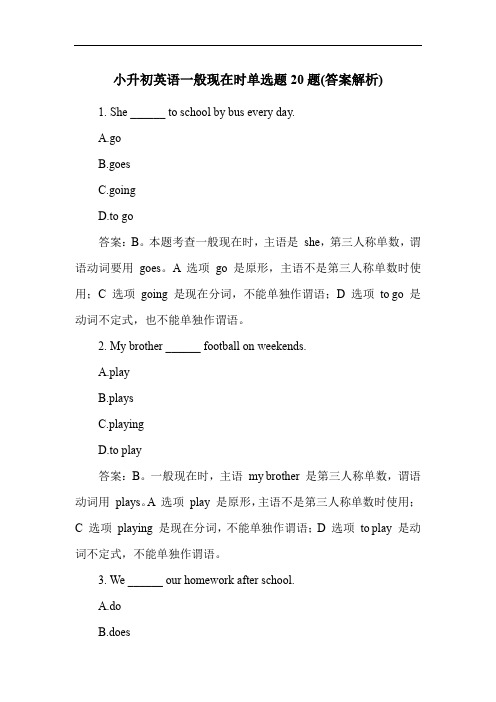
小升初英语一般现在时单选题20题(答案解析)1. She ______ to school by bus every day.A.goB.goesC.goingD.to go答案:B。
本题考查一般现在时,主语是she,第三人称单数,谓语动词要用goes。
A 选项go 是原形,主语不是第三人称单数时使用;C 选项going 是现在分词,不能单独作谓语;D 选项to go 是动词不定式,也不能单独作谓语。
2. My brother ______ football on weekends.A.playB.playsC.playingD.to play答案:B。
一般现在时,主语my brother 是第三人称单数,谓语动词用plays。
A 选项play 是原形,主语不是第三人称单数时使用;C 选项playing 是现在分词,不能单独作谓语;D 选项to play 是动词不定式,不能单独作谓语。
3. We ______ our homework after school.A.doB.doesC.doingD.to do答案:A。
一般现在时,主语we 是第一人称复数,谓语动词用原形do。
B 选项does 用于第三人称单数;C 选项doing 是现在分词,不能单独作谓语;D 选项to do 是动词不定式,不能单独作谓语。
4. My father ______ to work by car.A.goB.goesC.goingD.to go答案:B。
一般现在时,主语my father 是第三人称单数,谓语动词用goes。
A 选项go 是原形,主语不是第三人称单数时使用;C 选项going 是现在分词,不能单独作谓语;D 选项to go 是动词不定式,不能单独作谓语。
5. I ______ reading books in my free time.A.likeB.likesC.likingD.to like答案:A。
小升初语法辨析一般现在时一般过去时一般将来时(讲义)人教PEP版英语六年级下册

小升初英语语法辨析:一般现在时、一般过去时、一般将来时&专项模拟练习一、一般现在时1.定义:表示经常发生的动作、存在的状态或普遍真理。
2.时间标志词:often(经常)、usually(通常)、always(总是)、sometimes(有时)、every day/week/month/year(每天/ 周/ 月/ 年)等。
3.结构:1.主语(非第三人称单数)+ 动词原形。
例如:You play basketball afterschool.(你放学后打篮球。
)2.主语(第三人称单数)+ 动词的第三人称单数形式。
例如:He playsbasketball after school.(他放学后打篮球。
)4.用法:1.表示经常性或习惯性的动作。
如:I go to school by bike every day.(我每天骑自行车去上学。
)2.表示现在的状态或特征。
如:She is tall and thin.(她又高又瘦。
)3.表示客观事实或普遍真理。
如:The earth moves around the sun.(地球绕着太阳转。
)二、一般过去时1.定义:表示过去某个时间发生的动作或存在的状态。
2.时间标志词:yesterday(昨天)、last week/month/year(上周/ 上个月/ 去年)、ago(……以前)、in + 过去的年份等。
3.结构:主语+ 动词的过去式。
例如:You played basketball yesterday.(你昨天打了篮球。
)4.用法:1.表示过去某个时间发生的动作。
如:I went to the park last Sunday.(我上周日去了公园。
)2.表示过去存在的状态。
如:He was happy yesterday.(他昨天很开心。
)三、一般将来时1.定义:表示将来某个时间要发生的动作或存在的状态。
2.时间标志词:tomorrow(明天)、next week/month/year(下周/ 下个月/ 明年)、in the future(在未来)等。
小升初英语语法知识点-一般现在时讲义 (全国通用版)

小升初一般现在时讲义一般现在时定义1.表示事物或人物的特征、状态。
如:Tom is tall. Tom长得很高。
Those flowers are red. 那些花是红色的。
2.表示经常性或习惯性的动作。
如:I usually get up at eight o’clock.我通常在八点起床。
He lives in Beijing. 他住在北京。
3.表示客观真理。
如:The earth goes around the sun.地球绕着太阳转。
Summer comes after spring.春去夏来。
一般现在时的构成①当谓语动词是be动词时,构成为:主语+be动词(am,is,are)+其他。
如:They are my friends.他们是我的朋友。
①当主语是行为动词时,构成有两种:(1)主语(非第三人称单数)+动词原形+其他。
如:We often go to the park at weekends.我们经常在周末去公园。
(2)主语(第三人称单数)+动词第三人称单数形式+其他。
如:Tim usually plays basketball after school.Tim通常会在放学后打篮球。
①句型变换(难点)如何把陈述句改为一般疑问句?可以按照以下步骤:1. 在陈述句中寻找is\am\are\can\will这几个单词I am a student.She is a beautiful girl.He is a strong boy.They are cute dogsI can swim very well.I will go to Beijing this summer.2.若句子中出现is\am\are\can\will几个单词,就直接把这几个单词放到句子的最前面,后面句子照抄,注意大小写字母的变化,并把句点改为问号。
I am a student.→Are you a student?(I am 是特殊的,通常用Are you…?进行提问)She is a beautiful girl.→Is she a beautiful girl ?He is a strong boy.→ Is he a strong boy?They are cute dogs.→ Are they cute dogs?I can swim very well.→Can you swim very well?(句子中出现I,都要改成you)I will go to Beijing this summer.→Will you go to Beijing this summer?3.若句子中没有出现以上几个单词,就要用助动词do\ does来进行提问,放在句子的最前面。
小升初英语专项复习第12讲:一般现在时 外研版一起
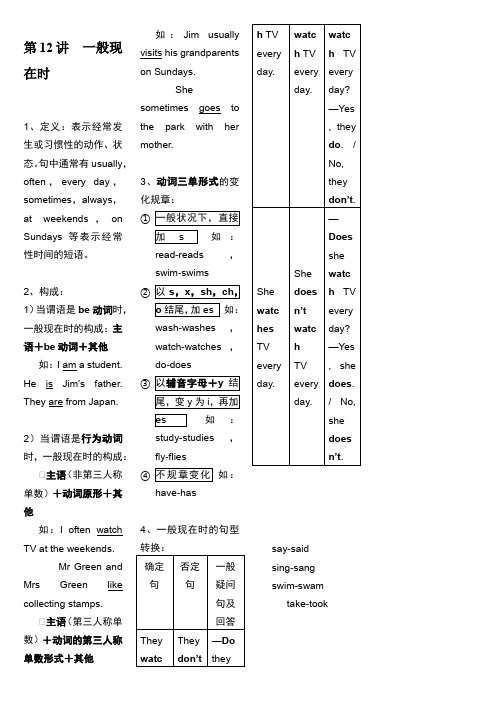
第12讲一般现在时
1、定义:表示经常发生或习惯性的动作、状态。
句中通常有usually,often,every day,sometimes,always,
at weekends,on Sundays等表示经常性时间的短语。
2、构成:
1)当谓语是be动词时,一般现在时的构成:主语+be动词+其他
如:I am a student. He is Jim’s father. They are from Japan.
2)当谓语是行为动词时,一般现在时的构成:
①主语(非第三人称单数)+动词原形+其他
如:I often watch TV at the weekends.
Mr Green and Mrs Green like collecting stamps.
①主语(第三人称单数)+动词的第三人称单数形式+其他
如:Jim usually
visits his grandparents
on Sundays.
She
sometimes goes to
the park with her
mother.
3、动词三单形式的变
化规章:
①
如:
read-reads,
swim-swims
②
如:
wash-washes,
watch-watches,
do-does
③
如:
study-studies,
fly-flies
④如:
have-has
4、一般现在时的句型
转换:say-said
sing-sang
swim-swam
take-took。
专题08 一般现在时_备战2021年小升初英语必考语法和题型(解析版)
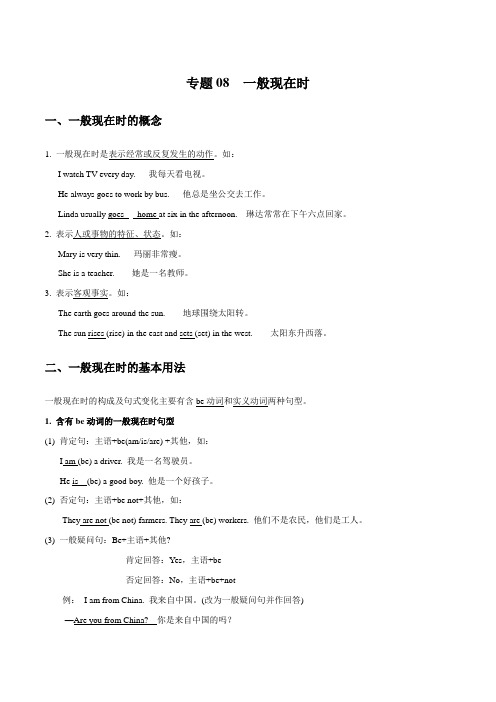
专题08 一般现在时一、一般现在时的概念1. 一般现在时是表示经常或反复发生的动作。
如:I watch TV every day. 我每天看电视。
He always goes to work by bus. 他总是坐公交去工作。
Linda usually goes home at six in the afternoon. 琳达常常在下午六点回家。
2. 表示人或事物的特征、状态。
如:Mary is very thin. 玛丽非常瘦。
She is a teacher. 她是一名教师。
3. 表示客观事实。
如:The earth goes around the sun. 地球围绕太阳转。
The sun rises (rise) in the east and sets (set) in the west. 太阳东升西落。
二、一般现在时的基本用法一般现在时的构成及句式变化主要有含be动词和实义动词两种句型。
1. 含有be动词的一般现在时句型(1) 肯定句:主语+be(am/is/are) +其他,如:I am (be) a driver. 我是一名驾驶员。
He is (be) a good boy. 他是一个好孩子。
(2) 否定句:主语+be not+其他,如:They are not (be not) farmers. They are (be) workers. 他们不是农民,他们是工人。
(3) 一般疑问句:Be+主语+其他?肯定回答:Yes,主语+be否定回答:No,主语+be+not例:I am from China. 我来自中国。
(改为一般疑问句并作回答)—Are you from China? 你是来自中国的吗?—Yes, I am. 是的,我是来自中国。
—No, I am not. 不是,我不是来自中国。
2. 含有实义动词的一般现在时句型。
(1) 肯定句:主语+动词原形+其他。
(主语为非第三人称单数时用)主语+动词三单+其他。
小升初英语一般现在时特殊用法单选题50题
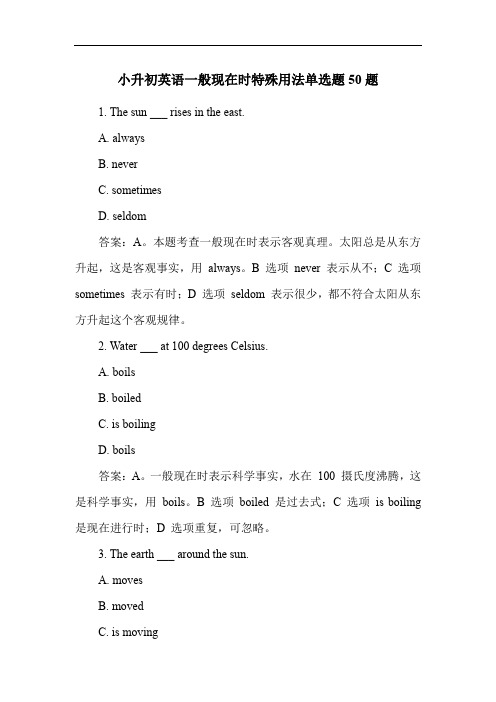
小升初英语一般现在时特殊用法单选题50题1. The sun ___ rises in the east.A. alwaysB. neverC. sometimesD. seldom答案:A。
本题考查一般现在时表示客观真理。
太阳总是从东方升起,这是客观事实,用always。
B 选项never 表示从不;C 选项sometimes 表示有时;D 选项seldom 表示很少,都不符合太阳从东方升起这个客观规律。
2. Water ___ at 100 degrees Celsius.A. boilsB. boiledC. is boilingD. boils答案:A。
一般现在时表示科学事实,水在100 摄氏度沸腾,这是科学事实,用boils。
B 选项boiled 是过去式;C 选项is boiling 是现在进行时;D 选项重复,可忽略。
3. The earth ___ around the sun.A. movesB. movedC. is moving答案:A。
地球绕着太阳转是客观真理,用一般现在时moves。
B 选项moved 是过去式;C 选项is moving 是现在进行时;D 选项move 形式错误,主语the earth 是第三人称单数,动词要用moves。
4. Light ___ faster than sound.A. travelsB. traveledC. is travelingD. travel答案:A。
光比声音传播速度快是科学事实,用一般现在时travels。
B 选项traveled 是过去式;C 选项is traveling 是现在进行时;D 选项travel 形式错误,主语light 是第三人称单数,动词要用travels。
5. Two and two ___ four.A. makeB. makesC. madeD. making答案:B。
2 加2 等于4 是客观事实,用一般现在时。
小升初英语语法解析:一般现在时

小升初英语语法解析:一般现在时小升初的英语考试内容涉及并不多,下面就是小编给大家带来的小学英语语法一般现在时的语法解析,希望能帮助到大家!小升初英语语法解析:一般现在时一:定义一般现在时 (The simple present tense) :一般现在时表示现在经常反复发生的动作,存在的状态或习惯性的动作的时态。
二、一般现在时的用法:1.表示经常或习惯性的动作。
常与often(经常), always(总是), sometimes(有时), every day(每天)on Sundays/Mondays 等表示频度的时间状语连用。
一般现在时的时间状语有:today, often, sometimes, always, usually, every day ( week, month, year,…), this year, once a week ( month, year, …)例句:I get up at 6 o’clock every day. 我每天早上6点钟起床。
He often goes to school by bike. 他经常骑自行车去学校。
2. 表示客观事实,普遍真理。
例句:Two and two is four. 二加二等于四。
The earth moves around the sun. 地球绕着太阳转。
三、一般现在时的结构:一般现在时用行为动词的原形,但第三人称单数作主语时,动词的词尾要加-s 或 - es。
以下将对一般现在时的肯定句、否定句、疑问句及其答语的构成加以说明:A、当谓语是be动词时,构成为:肯定句:主语 + be动词 ( am, is, are ) + 其他。
I am a student.否定句:主语+be动词 ( am, is, are ) + not +其他。
I am not a student.疑问句:be动词 ( am, is, are ) + 主语 + 其他? Am I a student?肯定回答:Yes,主语 + be动词 ( am, is, are ) Yes, I am.否定回答:No,be动词 ( am, is, are ) + not. No, I am not.B、当谓语是行为动词时,构成有两种:(1)当主语为非第三人称单数时:肯定句:主语+动词原形+其它We watch TV at home.否定句:主语+don't+动词原形+其它We don’t watch TV at home.一般疑问句:Do+主语+动词原形+其它Do we watch TV at home?肯定回答:Yes,主语+doYes, we do.否定回答:No,主语+don'tNo, we don’t.(2)当主语是第三人称单数时:肯定句:主语+动词s+其它She reads books.否定句:主语+doesn't+动词原形+其它She doesn’t read books.一般疑问句:Does+主语+动词原形+其它Does she read books?肯定回答: Yes,主语+does.Yes, she does.否定回答: No,主语+doesn't.No, she doesn’t.四、动词加-s 或-es (动词第三人称单数):当主语是第三人称单数时,谓语动词需用动词的“三单变化”加-s 或-es。
小升初英语一般现在时一般过去时现在进行时综合完形填空题30题
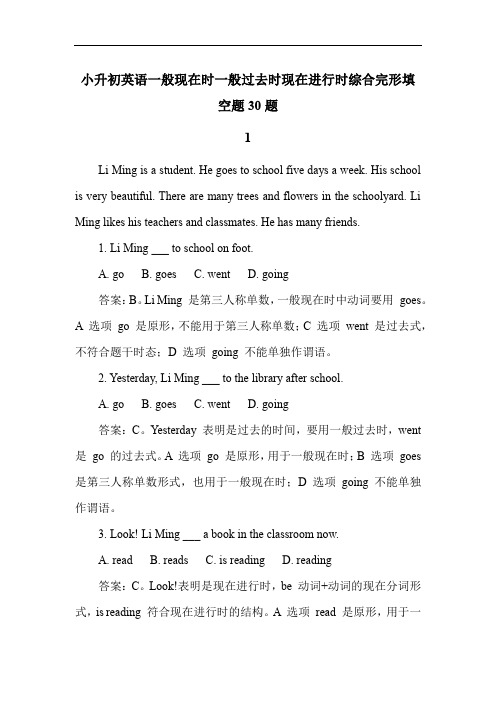
小升初英语一般现在时一般过去时现在进行时综合完形填空题30题1Li Ming is a student. He goes to school five days a week. His school is very beautiful. There are many trees and flowers in the schoolyard. Li Ming likes his teachers and classmates. He has many friends.1. Li Ming ___ to school on foot.A. goB. goesC. wentD. going答案:B。
Li Ming 是第三人称单数,一般现在时中动词要用goes。
A 选项go 是原形,不能用于第三人称单数;C 选项went 是过去式,不符合题干时态;D 选项going 不能单独作谓语。
2. Yesterday, Li Ming ___ to the library after school.A. goB. goesC. wentD. going答案:C。
Yesterday 表明是过去的时间,要用一般过去时,went 是go 的过去式。
A 选项go 是原形,用于一般现在时;B 选项goes 是第三人称单数形式,也用于一般现在时;D 选项going 不能单独作谓语。
3. Look! Li Ming ___ a book in the classroom now.A. readB. readsC. is readingD. reading答案:C。
Look!表明是现在进行时,be 动词+动词的现在分词形式,is reading 符合现在进行时的结构。
A 选项read 是原形,用于一般现在时;B 选项reads 是第三人称单数形式,也用于一般现在时;D 选项reading 不能单独作谓语。
4. Li Ming often ___ his homework after dinner.A. doB. doesC. didD. doing答案:B。
小升初英语一般现在时必考知识点

专题十二一般现在时一、一般现在时的用法1.重复的动作Amy brush her teeth every day. Amy每天刷牙。
2.现在的状态I am a teacher.我是一名老师。
3.表客观真理The sun is bigger than the moon.太阳比月亮大。
一般现在时的标志词always 总是usually 通常often 经常sometimes 有时seldom 极少,偶尔never 从不once a day 一天一次twice a week 一周两次three times a month 一个月三次every day 每天everyone week 每周every year 每年二、一般现在时的构成1. 主语+be(am,is,are)+其他eg. I am a girl.You are beautiful.They are students.2. 主语+动词原形/动词三单+其他eg. I go to the shop.He goes to the shop.重难点1.三单的用法①当主语为he,she,it时He runs quickly.②当主语为单个的人或物时Linda walks to school.③当主语为不定代词时Everyone is here.④当主语为不可数名词时The water is in the glass.2. 动词变三单的规则①一般直接加s walk-walks②以s,x,sh,ch,o结尾的单词,加es watch-watches brush-brushes③以辅音+y结尾的单词,变y为i加es study-studies fly-flies④特殊have-has三、一般现在时的基本句型结构①肯定句:主语+be+其他. He is a boy.否定句:主语+be not+其他. He is not a boy.一般疑问句:Be +主语+其他? Is he a boy?肯定回答:Yes, 主语+be. Yes, he is.否定回答:No,主语+be not. No, he is not.②肯定句:主语+动词原形/动词三单+其他. I like apples.否定句:主语+don’t/doesn’t+动词原形+其他. I don’t like apples.一般疑问句:Do/Does + 主语+ 动词原形+其他?Do you like apples?肯定回答:Yes, 主语+do/does Yes, I do.否定回答:No, 主语+don’t/doesn’t. No, I don’t.既没有be动词又没有情态动词的句型转换做题步骤:①变否定句a. 找出动词,判断形式b. 主语后加don’t或doesn’t或didn’t 注意:some变anyc. 动词变为原形,其余照抄②变一般疑问句a. 找出动词,判断形式注意:一二人称互换b. 句首加Do或Does或Did some变anyc. 动词变为原形,其余照抄。
小升初语法23-一般现在时
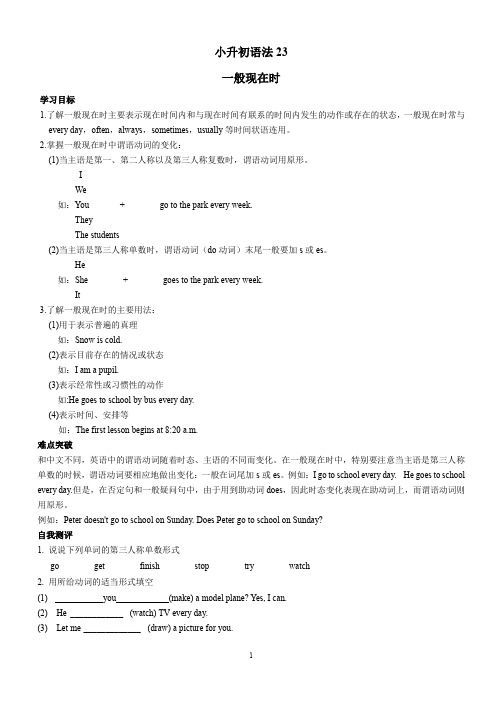
小升初语法23一般现在时学习目标1.了解一般现在时主要表示现在时间内和与现在时间有联系的时间内发生的动作或存在的状态,一般现在时常与every day,often,always,sometimes,usually等时间状语连用。
2.掌握一般现在时中谓语动词的变化:(1)当主语是第一、第二人称以及第三人称复数时,谓语动词用原形。
IWe如:You + go to the park every week.TheyThe students(2)当主语是第三人称单数时,谓语动词(do动词)末尾一般要加s或es。
He如:She + goes to the park every week.It3.了解一般现在时的主要用法:(1)用于表示普遍的真理如:Snow is cold.(2)表示目前存在的情况或状态如:I am a pupil.(3)表示经常性或习惯性的动作如:He goes to school by bus every day.(4)表示时间、安排等如:The first lesson begins at 8:20 a.m.难点突破和中文不同,英语中的谓语动词随着时态、主语的不同而变化。
在一般现在时中,特别要注意当主语是第三人称单数的时候,谓语动词要相应地做出变化:一般在词尾加s或es。
例如:I go to school every day. He goes to school every day.但是,在否定句和一般疑问句中,由于用到助动词does,因此时态变化表现在助动词上,而谓语动词则用原形。
例如:Peter doesn't go to school on Sunday. Does Peter go to school on Sunday?自我测评1. 说说下列单词的第三人称单数形式go get finish stop try watch2. 用所给动词的适当形式填空(1) you (make) a model plane? Yes, I can.(2) He ____________ (watch) TV every day.(3) Let me _____________ (draw) a picture for you.(4) How _____________ your mother____________ (go) to work every day?(5) They like _____________ (listen) to the music.(6) I (be) a boy of Grade Four.3. 选择填空( ) (1) He eats his breakfast 7:00 in the morning.A. onB. inC. at( ) (2) How many bananas in the bag?A. is thereB. are thereC. they are( ) (3) What ________ you want?A. doB. haveC. does( ) (4) These shirts are so nice but ________ quite cheap.A. theyB. it isC. they are( ) (5) Does Mike _________ ice-cream?A. likeB. likesC. liking( ) (6) What _________ Linda got?A. hasB. haveC. does( ) (7) Danny wants a new pen. He __________like his old one.A. doesn'tB. isC. do( ) (8) Can I have some milk, please? Here you __________ .A. isB. areC. some( ) (9) It's not hot now. Please the door.A. closeB. nodC. open( ) (10) What _________ your mother need?A. doB. doesC. has4. 听短文,填入所缺的词Jimmy and I twins. Every day we school on foot. We study in the same school, we in the same class. We lunch at school. We go home at 5 o' clock.(1) What's my friend's name?(2)What time does Meg get up?(3)What does Meg eat for breakfast?(4)Does Meg go to school at seven o'clock?(5)What does Meg do at nine o'clock every evening?趣味阅读A StoryOne morning, the hare and the tortoise have a race. At first the hare runs very fast. He is far ahead of the tortoise. He sits under a tree and soon he falls asleep. The tortoise keeps on running hard. At last the tortoise wins the race. He says to the hare: "Mr. Hare, you can run faster than me. But I got here first." The hare's face turns red.根据短文内容回答问题1. Who is having a race?2. Does the hare run fast at first?3. At last who wins the race?_______________________________________________________________________________________4. Why can the tortoise win the race?5. How does the hare feel?Keys:1. 略。
小升初英语一般现在时特殊用法完形填空题40题
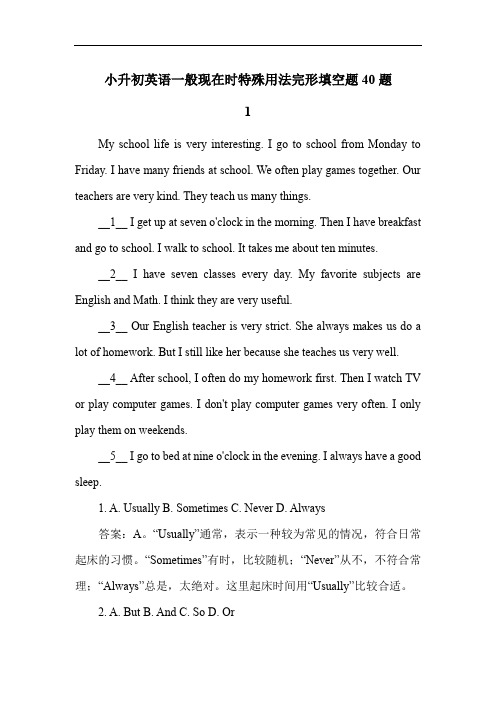
小升初英语一般现在时特殊用法完形填空题40题1My school life is very interesting. I go to school from Monday to Friday. I have many friends at school. We often play games together. Our teachers are very kind. They teach us many things.__1__ I get up at seven o'clock in the morning. Then I have breakfast and go to school. I walk to school. It takes me about ten minutes.__2__ I have seven classes every day. My favorite subjects are English and Math. I think they are very useful.__3__ Our English teacher is very strict. She always makes us do a lot of homework. But I still like her because she teaches us very well.__4__ After school, I often do my homework first. Then I watch TV or play computer games. I don't play computer games very often. I only play them on weekends.__5__ I go to bed at nine o'clock in the evening. I always have a good sleep.1. A. Usually B. Sometimes C. Never D. Always答案:A。
小升初英语一般现在时肯定回答单选题50题
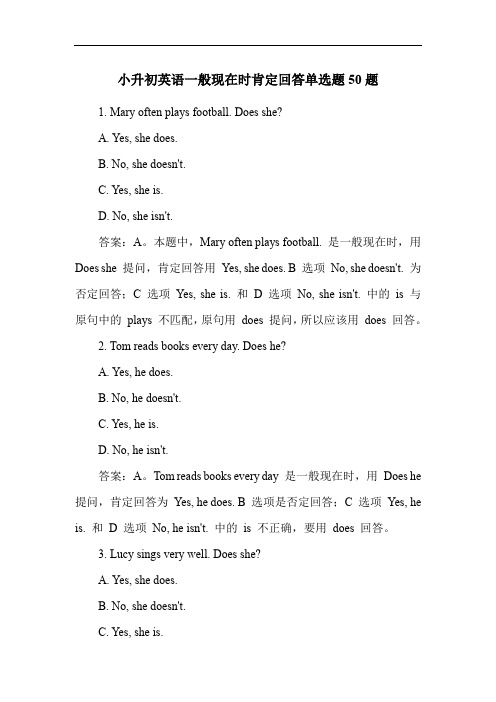
小升初英语一般现在时肯定回答单选题50题1. Mary often plays football. Does she?A. Yes, she does.B. No, she doesn't.C. Yes, she is.D. No, she isn't.答案:A。
本题中,Mary often plays football. 是一般现在时,用Does she 提问,肯定回答用Yes, she does. B 选项No, she doesn't. 为否定回答;C 选项Yes, she is. 和D 选项No, she isn't. 中的is 与原句中的plays 不匹配,原句用does 提问,所以应该用does 回答。
2. Tom reads books every day. Does he?A. Yes, he does.B. No, he doesn't.C. Yes, he is.D. No, he isn't.答案:A。
Tom reads books every day 是一般现在时,用Does he 提问,肯定回答为Yes, he does. B 选项是否定回答;C 选项Yes, he is. 和D 选项No, he isn't. 中的is 不正确,要用does 回答。
3. Lucy sings very well. Does she?A. Yes, she does.B. No, she doesn't.C. Yes, she is.D. No, she isn't.答案:A。
Lucy sings very well 是一般现在时,Does she 提问,肯定回答是Yes, she does. B 选项为否定回答;C 和D 选项中的is 不符合原句用does 提问的形式,要用does 回答。
4. Jack studies hard. Does he?A. Yes, he does.B. No, he doesn't.C. Yes, he is.D. No, he isn't.答案:A。
小升初英语一般现在时疑问句单选题50题(含答案)
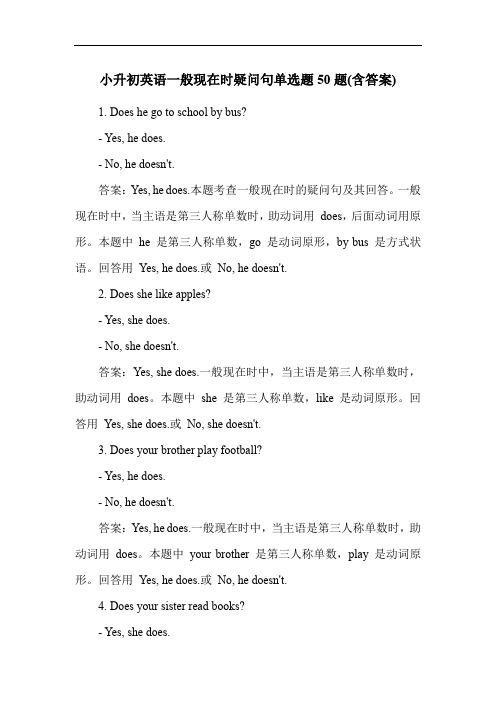
小升初英语一般现在时疑问句单选题50题(含答案)1. Does he go to school by bus?- Yes, he does.- No, he doesn't.答案:Yes, he does.本题考查一般现在时的疑问句及其回答。
一般现在时中,当主语是第三人称单数时,助动词用does,后面动词用原形。
本题中he 是第三人称单数,go 是动词原形,by bus 是方式状语。
回答用Yes, he does.或No, he doesn't.2. Does she like apples?- Yes, she does.- No, she doesn't.答案:Yes, she does.一般现在时中,当主语是第三人称单数时,助动词用does。
本题中she 是第三人称单数,like 是动词原形。
回答用Yes, she does.或No, she doesn't.3. Does your brother play football?- Yes, he does.- No, he doesn't.答案:Yes, he does.一般现在时中,当主语是第三人称单数时,助动词用does。
本题中your brother 是第三人称单数,play 是动词原形。
回答用Yes, he does.或No, he doesn't.4. Does your sister read books?- Yes, she does.- No, she doesn't.答案:Yes, she does.一般现在时中,当主语是第三人称单数时,助动词用does。
本题中your sister 是第三人称单数,read 是动词原形。
回答用Yes, she does.或No, she doesn't.5. Does your father go to work by car?- Yes, he does.- No, he doesn't.答案:Yes, he does.一般现在时中,当主语是第三人称单数时,助动词用does。
小升初英语一般现在时肯定回答完形填空题20题答案解析版

小升初英语一般现在时肯定回答完形填空题20题答案解析版1Tom is a primary school student. He gets up early every day. After getting up, he brushes his teeth and washes his face. Then he has breakfast. After breakfast, he goes to school. He likes his school very much. At school, he studies hard. He has many friends. They often play games together after class.Tom ___ loves his parents. They take good care of him. He ___ helps his parents do some housework on weekends. He ___ is good at English. His English teacher often praises him. He ___ wants to be an English teacher in the future.1. Tom ___ loves his parents.A. alwaysB. sometimesC. neverD. often答案:A。
解析:always 表示总是,符合语境。
sometimes 有时;never 从不;often 经常,都不如always 更能体现Tom 对父母的爱。
一般现在时中,主语是第三人称单数,谓语动词要用三单形式loves,这里的频率副词always 用来修饰loves。
2. He ___ helps his parents do some housework on weekends.A. usuallyB. seldomC. alwaysD. hardly ever答案:C。
- 1、下载文档前请自行甄别文档内容的完整性,平台不提供额外的编辑、内容补充、找答案等附加服务。
- 2、"仅部分预览"的文档,不可在线预览部分如存在完整性等问题,可反馈申请退款(可完整预览的文档不适用该条件!)。
- 3、如文档侵犯您的权益,请联系客服反馈,我们会尽快为您处理(人工客服工作时间:9:00-18:30)。
They are going to play basketball We are swimming now.tom o rr o w.Tom played computer game yesterday. John does sports every day.英语时态就是用动词的形式变化来表示不同时间发生的动作或存在的状态。
英语中,每一句话都至少包含一种时态,所以我们应该认识到时态的重要性。
小学阶段常见的时态有四种。
下面我们来一一地认识它们。
第一讲一般现在时She goes to school every day. 她每天去上学。
一般现在时通常表示习惯性、经常发生的动作或存在的状态。
如:I am a pupil, I like singing and dancing.我是一个小学生,我喜欢唱歌和跳舞。
She is my friend,we often go to school together.她是我的朋友,我们经常一起去上学。
We do homework every day.我们每天写作业。
He teaches English.他教英语。
语法精讲动词的一般现在时1. 第一人称单数 (I) +am I am hungry. 我饿了。
_______________________________. 我是中国人。
2. 第二人称单数 (you) /各人称复数 (We/you/they) +are You are a handsome boy. 你是一个很帅的男孩子。
_______________________________. 他们现在很忙。
3. 第三人称单数 (he/she/it) +isShe is a good teacher. 她是个很好的老师。
____________________. 它是我的宠物。
1.第三人称单数(he/she/it)+动词单三形式Ann gets up at 8 o’clock every morning. Ann 每天早上八点钟起床。
She studies hard. 她学习努力。
_______________________________________. 他每天晚上看电视。
2.第一/二人称单数(I /you)/各人称复数(we/you/they) You do well in English. 你英语学的很好。
They all run fast in the sports meeting. 他们在运动会上跑的都很快。
________________________________________. 我们想在周末去旅行。
动词第三人称单数形式变化规则:一般现在时的形式 1 23be 动词有以下几种缩写形式:I am= I’m he is=he’s she is= she’s It is =It’s we are=we’re you are= you’re t hey are =they’realways, usually, often, sometimes, seldom (很少), never (决不), every day, at 8:30, on Sunday, in the morning 等。
如:I always get up at 6:00 in the morning. 我总是早上六点钟起床。
表示客观的事实或者格言警句。
如:The sun rises in the east. 太阳从升起。
Pride goes before a fall. 骄者必败。
一般现在时的一般疑问句是把助动词do, 或does 放在句首来引导。
1、如果句子的主语是I, we, you, they 或复数名词时,用do 来引导,其余句子的位置不变。
肯定回答:Yes, I/we/they do. 否定回答:No, I/we/they don’t.如:They go to school by bus every day.→______________________________________?→______________.(肯定回答)→______________.(否定回答) 2、如果句子的主语是he, she, it 或单数名词时,用does 来引导,其余句子的位置不变,但是要把原来句子中的动词第三人称单数形式,改为动词原形。
肯定回答:Yes, he/she/it does. 否定回答: No, he/she/it doesn ’t.如:He often goes to school by bike.→________________________________________?→_________________. (肯定回答) →_______________. (否定回答) 一般现在时的否定句1.如果句子的主语是I, we, you, they 或复数名词时,则在主语的后面加don ’t 。
如: We always go to school on foot.→_______________________________________.一、写出下列动词的第三人称单数形式。
1.drink___________ 111.buy___________ 21.pass __________2.stay____________ 12.say___________ 22.watch_________3.make___________ 13.move_________ 23.brush_________4.look____________ 14.read__________ 24.teach__________e___________ 15.play__________ 25.catch__________6.plant___________ 16.help__________ 26.wash__________7.sit_____________ 17.ask___________ 27.carry__________8.eat ____________ 18.like___________ 28.fly____________9.run ____________ 19.go____________ 29.study__________10.begin _________ 20.do____________ 30.have___________二、用do does填空。
1. _____ you ride a bike after school? Yes, I _______ .2. ______ your sister like P.E.? No, she ______ not.3. What ______ the students have? They have some pens.4. How _____ Linda go to school? She goes to school on foot.5. He ______ not speak English. He speaks Japanese.三、按照要求改写句子。
1. Mike watches TV every evening. (改为否定句)___________________________________________________2. I do my homework every day. (改为一般疑问句,作否定回答)___________________________________________________3. Amy likes playing computer games. (改为一般疑问句,作否定回答)___________________________________________________4. She likes milk. (改为一般疑问句,作肯定回答)___________________________________________________5. He speaks English very well. (改为否定句)___________________________________________________四、用所给词的适当形式填空。
1. ____ her sister ______ (have) a tennis racket?2. _____ your friend ______ (like) basketball?3. We _____ (play) football every day.4. It_____ (sound) very well.5. Jim _____ (want) an orange.6. My mother ______(watch)TV in the evening.7. ____ you _____ (like) English?8. Mike and Li Lei _______ (not like) eggs.9. What color_____ your sister______ (like)?10. She ______ (know) a little English.五、用be动词的适当形式填空。
1. ---How____ you? ---I____ fine.2. I___ David, and my family name___ Green.3. ---What color ___ your clock? ---It___ white.4. ---What___ this in English? ---It___ an apple.5. Toy ___ my brother. David____ my brother, too. They ___ my brothers.6. Look! These ____ apple trees.7. We____ good students and you____ good teacher.8. My sister and my brother_____ students.9. Five and three ____ eight.10. ____your card number 5578?知识套餐一、单项选择。
1. _____ he _____ to the park at 6:30 in the morning? No, he _____ .A. Does; goes; doesB. Does; go; doesn’tC. Does; go; does2. Tim always _____ a picture at home. He _____ a car now.A. draws; is drawingB. draw; drawC. draws; draw3. She usually _____ her friends. They often _____ tea.A. see; drinkB. sees; drinksC. sees; drink4. He usually _____ the dishes at night, but tonight he _____ clothes.A. wash; washB. washes; is going to washC. is washing; washes5. Mr. Green usually _____ his newspaper in the evening, but he and his wife_____ television yesterday evening.A. reads; watchesB. reads; is going to watchC. reads; watched二、阅读理解。
